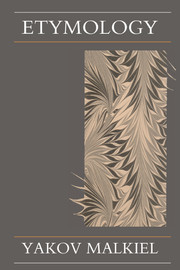3 - The second half of the twentieth century
Published online by Cambridge University Press: 05 June 2012
Summary
In the forty-year period surveyed in this concluding section of our venture (1950–1990), etymology can be seen steering a strange course, as if its practitioners and its beneficiaries were sometimes working at cross purposes; in addition, irreconcilably conflicting ideas all too often prevailed inside each group. There are few exceptions from this trend towards diversification at almost any cost. One rare universal is the fact that a single, particular genre of etymological guide is at present clearly doomed to rapid disappearance (not least for economic reasons), namely the dictionary of word origins in Language X expounded in Language Y (assuming, of course, that both X and Y are major living tongues). The nearly-extinct type of lexicographic compilation here hinted at is exemplified by Max Vasmer's meritorious work on Russian and Ernst Gamillscheg's on French, each phrased in German, in conformity with an old tradition. To be sure, there was published a revised translation into Russian, by O. N. Trubacëv, of the former, and a slightly expanded second edition of the latter made its appearance in the original garb without, it is true, producing any stir outside Central Europe. Yet, the more characteristic course of recent events can be illustrated by the fluctuating fortunes of Walther von Wartburg's incomparably more ambitious and influential venture, which concerns Gallo-Romance lexis as a whole, and more. At the outset the monumental project was undertaken as a venture to be worded in German, and was so continued, when the author moved from Lausanne to Leipzig.
- Type
- Chapter
- Information
- Etymology , pp. 105 - 166Publisher: Cambridge University PressPrint publication year: 1993



